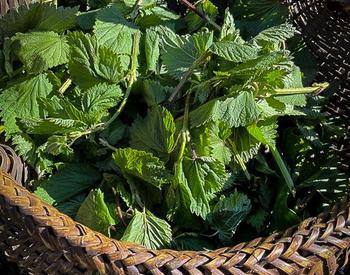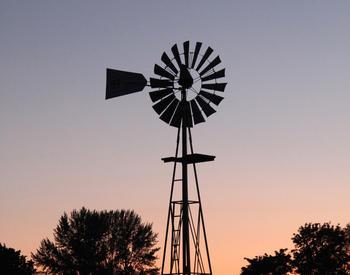Transcript
[Music]
I never miss an opportunity to talk about the 1914 Smith-Lever Act. If you're unfamiliar, this is the act that created Extension as we know it today. And from its conception, Extension was a place where rural Americans could get education about the latest agricultural techniques and new technologies. Extension has evolved quite a bit over the past 100 years, but we're always a place where people can get their questions answered. You can pick up the phone, walk into an office, or send an email, and it doesn't matter how hard or weird your question is, from controlling crows to pickling vegetables, we have answers for you. It's who we are, it's what we do.
2020 brought a lot of really difficult questions to our communities, and Extension needed to be there to help answer them, to keep our communities healthy and safe. On March 3rd, Oregon confirmed its first case of COVID-19. A few days later, I hosted my first annual Orchard Manager's Breakfast meeting, and the orchardists weren't thinking at all about COVID-19. It was a faraway problem, and they didn't think it would ever get here. They thought it would be under control.
As an anxious person, I watched the orchardists handle cutlery and crafts of coffee and stand close to one another. I couldn't help but become more nervous about COVID-19. It seemed like it was inevitable that it would come to our community and it would probably be here just in time for harvest. I started reaching out to our local public health office and asking them if they had any guidance documents for helping prepare the orchardists for the influx of migrant workers we would see in just a few short months.
In May, the Dalles becomes alive with 6,000 more people. 6,000 migrant workers come here to pick cherries, and I knew that we needed to be prepared to get these new members of our community. Migrant workers often live in very tight spaces and they work very close together, and social distancing is sometimes just not an option for these people. But public health didn't have any guidance. Oregon Health Authority didn't have any guidance. There was absolutely nothing out there.
On March 30th, I got a call from Wasco County Emergency Operations Center. They were looking for someone the orchardists trusted. They were looking for someone to answer the questions they had about what to do for COVID-19 in an orchard. They needed to know what the orchardists knew and didn't know. They needed somebody to answer all of these questions, and frankly, orchardists tend to be not exactly trusting of the government, so this was going to be an uphill battle if there wasn't somebody that had their trust.
The government didn't know much about what goes on in an orchard. Our local government didn't. They didn't know what sort of trainings workers received. They didn't know about GAP certifications. They had no idea, and frankly, most of them had never really been on a large orchard, and they certainly hadn't been inside migrant worker housing, so they had no idea. They needed somebody to bridge this gap. They needed somebody to answer these questions. They asked me if I would be that person. I agreed reluctantly. I didn't really want to do this. I am a tree fruit horticulturalist and a soil scientist. I dig holes. I don't know anything about human health, and I certainly don't know anything about how to create an effective supply chain or how to use government documents to find the last case of bleach in Oregon. I wasn't trained to do this, and frankly, I didn't want to do it. I wanted to be out planting brand new trees, and I wanted to be writing papers. But someone needed to answer these questions, and somebody needed to bring these folks together, the orchardists and our local government.
You should never underestimate what Extension agents can do. A small group of Extension agents can move mountains and create massive change in a short amount of time. As soon as I got off the phone with the Wasco County Emergency Operations Center, I started calling all of the orchardists in my contacts to figure out what exactly they needed and what questions they had. And well, everybody had the same need. There was no hand sanitizer in the community, there were no masks, and there was no bleach for cleaning anything. And frankly, there were no guidance documents, and nobody had any idea how to keep their workers safe. So I started working with EOC to solve these problems, to answer these questions, and the EOC was fabulous. They immediately started working to get things like bleach. We bought bleach from Burgerville of all places. It was the only weird place we could find it. And they put in an order for masks, and they were able to purchase 4,000 masks with local government funds. 4,000 masks isn't nearly enough for 6,000 people. We needed at least two masks for every single worker in our community, one that they can wear and one that they can wash after a long hot day in the orchard.
So I looked for help in a very unexpected place. I put a little ad on Facebook asking for 600 masks, and this would be enough masks for me to give about 10 of my very small orchards two masks for each one of their workers. An Oregon State University Extension asked the community for 600 masks. We got 5,000. Sewers from all over Oregon came together and mailed masks to our Extension office. Lynette Black from our office, she started working with our EOC to get these materials out to the orchardists, all of this bleach and all of these masks and then this hand sanitizer and these KN95 masks that came from the state government. She started working to get these things out to the orchardists, and they were absolutely thrilled to have these resources.
And while she was working on that, we were waiting for some sort of health guidance for migrant seasonal farm workers from Oregon Health Authority, and we didn't know when it would come. And frankly, I started to worry if it would ever come. I started looking all over the internet trying to figure out what states that had their harvest right before ours were doing. I looked at places like North Carolina and California and looked at their guidance documents and started patching together guidance. As a horticulturalist, I was patching together health guidance. I took this patchwork of things and I brought it to our Emergency Operations Center and took it to our doctors on staff and said, "All right, help me fix this and make it usable for the farmers." So Dr. Mimi McDonald and I made this document functional and we handed it out to the farmers. Packets went out to all of them in addition to bleach and hand sanitizer and masks and everything they needed to help keep their workers safe and beautiful signage that described hand washing and great plain language. We were able to send all of that stuff out into our community.
We had a successful harvest in the Dalles. We did it. 38 people contracted COVID-19. 38 orchard workers contracted COVID-19 during our harvest season, and 25 of those are migrant seasonal farm workers. 38 farm workers contracting COVID-19 is 38 too many. COVID-19 disproportionately affects migrant seasonal farm workers and people of color in our communities all across
the country. In rural communities, farm workers became ill with COVID-19 and died. Wasco County was successful in preventing similar situations, not because of one person or because of one organization, but because our community came together.
In 1911, three years before the Smith-Lever Act was passed, the Board of Regents at what was the Oregon College of Agriculture came together to create the Oregon Extension Service. Three years before Smith-Lever, Oregonians were demanding answers to their questions, using research and science, and Extension was where to answer them. And we've answered those questions, those difficult questions for over a hundred years. And sometimes we don't have the training, sometimes we don't have the skill set, sometimes we do it on the fly. We've answered questions through economic downturns, through wildfires, and now through a pandemic. And why? Because it's who we are, it's what we do.
The Extension service has long served as a place where you could get all of your questions answered by experts. The 2020 COVID-19 pandemic put that role front-and-center in Wasco County. When cherry orchardists asked Extension where they could acquire PPE and how they could best protect their work force of 6,000 migrant workers, Extension got to work solving those complex problems. The Extension Horticulturist used her relationship with orchardists to assess the needs of the region. Orchardists needed COVID-19 education, face coverings, and cleaning solutions, and they needed these as soon as possible. Ashley Thompson rose to the challenge to step into a completely new role, building collaborative partnerships with public health, government agencies, non-profit health centers, and Oregon’s seamstresses to address these issues and ensure a healthy harvest. Attend this talk to learn more and hear how these partnerships resulted in a relatively low number of COVID-19 infections among migrant workers in Wasco County. Ashley Thompson, Assistant Professor and Extension Tree Fruit Horticulturist, Wasco and Hood River Counties


















